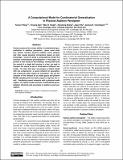A Computational Model for Combinatorial Generalization in Physical Perception from Sound
Author(s)
Wang, Yunyun; Gan, Chuang; Siegel, Max Harmon; Zhang, Zhoutong; Wi, Jiajun; Tenenbaum, Joshua B; ... Show more Show less
DownloadPublished version (1.445Mb)
Publisher with Creative Commons License
Publisher with Creative Commons License
Creative Commons Attribution
Terms of use
Metadata
Show full item recordAbstract
Humans possess the unique ability of combinatorial generalization in auditory perception: given novel auditory stimuli, humans perform auditory scene analysis and infer causal physical interactions based on prior knowledge. Could we build a computational model that achieves human-like combinatorial generalization? In this paper, we present a case study on box-shaking: having heard only the sound of a single ball moving in a box, we seek to interpret the sound of two or three balls of different materials. To solve this task, we propose a hybrid model with two components: a neural network for perception, and a physical audio engine for simulation. We use the outcome of the network as an initial guess and perform MCMC sampling with the audio engine to improve the result. Combining neural networks with a physical audio engine, our hybrid model achieves combinatorial generalization efficiently and accurately in auditory scene perception.
Date issued
2019Department
Massachusetts Institute of Technology. Department of Brain and Cognitive Sciences; Massachusetts Institute of Technology. Computer Science and Artificial Intelligence Laboratory; MIT-IBM Watson AI Lab; Center for Brains, Minds, and MachinesJournal
2019 Conference on Cognitive Computational Neuroscience
Publisher
Cognitive Computational Neuroscience
Citation
Wang, Yunyun, Gan, Chuang, Siegel, Max, Zhang, Zhoutong, Wu, Jiajun et al. 2019. "A Computational Model for Combinatorial Generalization in Physical Perception from Sound." 2019 Conference on Cognitive Computational Neuroscience.
Version: Final published version